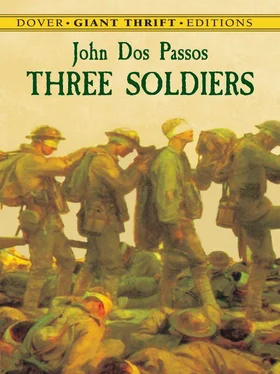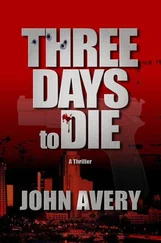THE oatmeal flopped heavily into the mess-kit. Fuselli’s eyes were still glued together with sleep. He sat at the dark greasy bench and took a gulp of the scalding coffee that smelt vaguely of dish rags. That woke him up a little. There was little talk in the mess shack. The men, that the bugle had wrenched out of their blankets but fifteen minutes before, sat in rows, eating sullenly or blinking at each other through the misty darkness. You could hear feet scraping in the ashes of the floor and mess kits clattering against the tables and here and there a man coughing. Near the counter where the food was served out one of the cooks swore interminably in a whiny sing-song voice.
“Gee, Bill, I’ve got a head,” said Fuselli.
“Ye’re ought to have,” growled Bill Grey. “I had to carry you up into the barracks. You said you were goin’ back and love up that goddam girl.”
“Did I?” said Fuselli, giggling.
“I had a hell of a time getting you past the guard.”
“Some cognac!… I got a hangover now,” said Fuselli.
“I’m goddamned if I can go this much longer.”
“What?”
They were washing their mess-kits in the tub of warm water thick with grease from the hundred mess-kits that had gone before, in front of the shack. An electric light illumined faintly the wet trunk of a plane tree and the surface of the water where bits of oatmeal floated and coffee grounds, — and the garbage pails with their painted signs: WET GARBAGE, DRY GARBAGE; and the line of men who stood waiting to reach the tub.
“This hell of a life!” said Bill Grey, savagely.
“What d’ye mean?”
“Doin’ nothin’ but pack bandages in packin’ cases and take bandages out of packin’ cases. I’ll go crazy. I’ve tried gettin’ drunk; it don’t do no good.”
“Gee; I’ve got a head,” said Fuselli.
Bill Grey put his heavy muscular hand round Fuselli’s shoulder as they strolled towards the barracks.
“Say, Dan, I’m goin’ A. W. O. L.”
“Don’t ye do it, Bill. Hell, look at the chance we’ve got to get ahead. We can both of us get promoted if we don’t get in wrong.”
“I don’t give a hoot in hell for all that… What d’ye think I got in this goddamed army for? Because I thought I’d look nice in the uniform?”
Bill Grey thrust his hands into his pockets and spat dismally in front of him.
“But, Bill, you don’t want to stay a buck private, do you?”
“I want to get to the front I don’t want to stay here till I get in the jug for being spiffed or get a court-martial… Say, Dan, will you come with me?”
“Hell, Bill, you ain’t goin’. You’re just kiddin’, ain’t yer?… They’ll send us there soon enough. I want to get to be a corporal,”-he puffed out his chest a little-“before I go to the front, so’s to be able to show what I’m good for. See, Bill?”
A bugle blew.
“There’s fatigue, an’ I ain’t done my bunk.”
“Me neither… They won’t do nothin’, Dan… Don’t let them ride yer, Dan.”
They lined up in the dark road feeling the mud slopping under their feet. The ruts were full of black water, in which gleamed a reflection of distant electric lights.
“All you fellows work in Storehouse A today,” said the sergeant, who had been a preacher, in his sad, drawling voice. “Lieutenant says that’s all got to be finished by noon. They’re sending it to the front today.”
Somebody let his breath out in a whistle of surprise.
“Who did that?”
Nobody answered.
“Dismissed!” snapped the sergeant disgustedly.
They straggled off into the darkness towards one of the lights, their feet splashing confusedly in the puddles.
Fuselli strolled up to the sentry at the camp gate. He was picking his teeth meditatively with the splinter of a pine board.
“Say, Phil, you couldn’t lend me a half a dollar, could you?” Fuselli stopped, put his hands in his pockets and looked at the sentry with the splinter sticking out of a corner of his mouth.
“Sorry, Dan,” said the other man; “I’m cleaned out. Ain’t had a cent since New Year’s.”
“Why the hell don’t they pay us?”
“You guys signed the pay roll yet?”
“Sure. So long!”
Fuselli strolled on down the dark road, where the mud was frozen into deep ruts, towards the town. It was still strange to him, this town of little houses faced with cracked stucco, where the damp made grey stains and green stains, of confused red-tiled roofs, and of narrow cobbled streets that zigzagged in and out among high walls overhung with balconies. At night, when it was dark except for where a lamp in a window spilt gold reflections out on the wet street or the light streamed out from a store or a café, it was almost frighteningly unreal. He walked down into the main square, where he could hear the fountain gurgling. In the middle he stopped indecisively, his coat unbuttoned, his hands pushed to the bottom of his trousers pockets, where they encountered nothing but the cloth. He listened a long time to the gurgling of the fountain and to the shunting of trains far away in the freight yards. “An’ this is the war,” he thought. “Ain’t it queer? It’s quieter than it was at home nights.” Down the street at the end of the square a band of white light appeared, the searchlight of a staff car. The two eyes of the car stared straight into his eyes, dazzling him, then veered off to one side and whizzed past, leaving a faint smell of petrol and a sound of voices. Fuselli watched the fronts of houses light up as the car made its way to the main road. Then the town was dark and silent again.
He strolled across the square towards the Cheval Blanc, the large café where the officers went.
“Button yer coat,” came a gruff voice. He saw a stiff tall f igure at the edge of the curve. He made out the shape of the pistol holster that hung like a thin ham at the man’s thigh. An M. P. He buttoned his coat hurriedly and walked off with rapid steps.
He stopped outside a café that had “Ham and Eggs” written in white paint on the window and looked in wistfully. Someone from behind him put two big hands over his eyes. He wriggled his head free.
“Hello, Dan,” he said. “How did you get out of the jug?”
“I’m a trusty, kid,” said Dan Cohen. “Got any dough?”
“Not a damn cent!”
“Me neither… Come on in anyway,” said Cohen. “I’ll fix it up with Marie.” Fuselli followed doubtfully. He was a little afraid of Dan Cohen; he remembered how a man had been court-martialed last week for trying to bolt out of a café without paying for his drinks.
He sat down at a table near the door. Dan had disappeared into the back room. Fuselli felt homesick. He was thinking how long it was since he had had a letter from Mabe. “I bet she’s got another feller,” he told himself savagely. He tried to remember how she looked, but he had to take out his watch and peep in the back before he could make out if her nose were straight or snub. He looked up, clicking the watch in his pocket. Marie of the white arms was coming laughing out of the inner room. Her large firm breasts, neatly held in by the close-fitting blouse, shook a little when she laughed. Her cheeks were very red and a strand of chestnut hair hung down along her neck. She picked it up hurriedly and caught it up with a hairpin, walking slowly into the middle of the room as she did so with her hands behind her head. Dan Cohen followed her into the room, a broad grin on his face.
“All right, kid,” he said. “I told her you’ld pay when Uncle Sam came across. Ever had any Kümmel?”
“What the hell’s that?”
“You’ll see.”
They sat down before a dish of fried eggs at the table in the corner, the favoured table, where Marie herself often sat and chatted, when wizened Madame did not have her eye upon her.
Читать дальше












